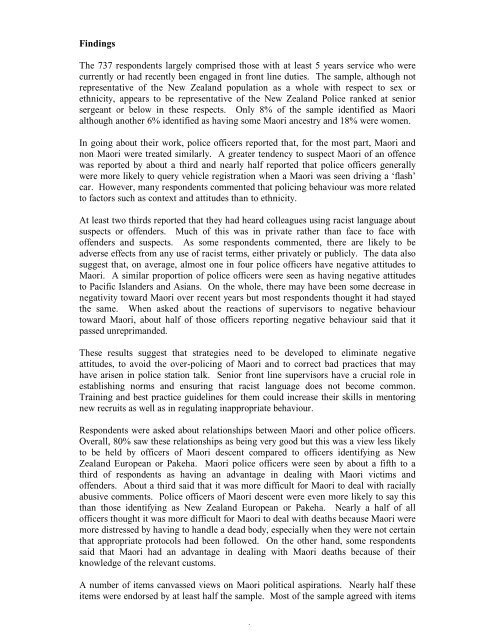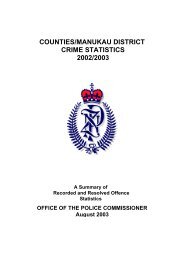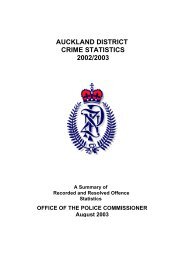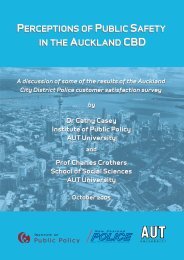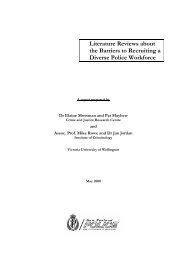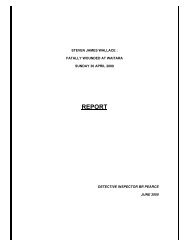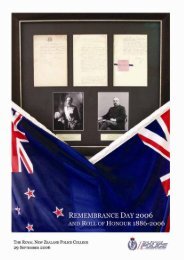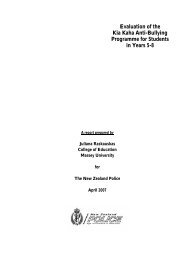Police Perceptions of Maori - Rethinking Crime and Punishment
Police Perceptions of Maori - Rethinking Crime and Punishment
Police Perceptions of Maori - Rethinking Crime and Punishment
Create successful ePaper yourself
Turn your PDF publications into a flip-book with our unique Google optimized e-Paper software.
Findings<br />
The 737 respondents largely comprised those with at least 5 years service who were<br />
currently or had recently been engaged in front line duties. The sample, although not<br />
representative <strong>of</strong> the New Zeal<strong>and</strong> population as a whole with respect to sex or<br />
ethnicity, appears to be representative <strong>of</strong> the New Zeal<strong>and</strong> <strong>Police</strong> ranked at senior<br />
sergeant or below in these respects. Only 8% <strong>of</strong> the sample identified as <strong>Maori</strong><br />
although another 6% identified as having some <strong>Maori</strong> ancestry <strong>and</strong> 18% were women.<br />
In going about their work, police <strong>of</strong>ficers reported that, for the most part, <strong>Maori</strong> <strong>and</strong><br />
non <strong>Maori</strong> were treated similarly. A greater tendency to suspect <strong>Maori</strong> <strong>of</strong> an <strong>of</strong>fence<br />
was reported by about a third <strong>and</strong> nearly half reported that police <strong>of</strong>ficers generally<br />
were more likely to query vehicle registration when a <strong>Maori</strong> was seen driving a ‘flash’<br />
car. However, many respondents commented that policing behaviour was more related<br />
to factors such as context <strong>and</strong> attitudes than to ethnicity.<br />
At least two thirds reported that they had heard colleagues using racist language about<br />
suspects or <strong>of</strong>fenders. Much <strong>of</strong> this was in private rather than face to face with<br />
<strong>of</strong>fenders <strong>and</strong> suspects. As some respondents commented, there are likely to be<br />
adverse effects from any use <strong>of</strong> racist terms, either privately or publicly. The data also<br />
suggest that, on average, almost one in four police <strong>of</strong>ficers have negative attitudes to<br />
<strong>Maori</strong>. A similar proportion <strong>of</strong> police <strong>of</strong>ficers were seen as having negative attitudes<br />
to Pacific Isl<strong>and</strong>ers <strong>and</strong> Asians. On the whole, there may have been some decrease in<br />
negativity toward <strong>Maori</strong> over recent years but most respondents thought it had stayed<br />
the same. When asked about the reactions <strong>of</strong> supervisors to negative behaviour<br />
toward <strong>Maori</strong>, about half <strong>of</strong> those <strong>of</strong>ficers reporting negative behaviour said that it<br />
passed unreprim<strong>and</strong>ed.<br />
These results suggest that strategies need to be developed to eliminate negative<br />
attitudes, to avoid the over-policing <strong>of</strong> <strong>Maori</strong> <strong>and</strong> to correct bad practices that may<br />
have arisen in police station talk. Senior front line supervisors have a crucial role in<br />
establishing norms <strong>and</strong> ensuring that racist language does not become common.<br />
Training <strong>and</strong> best practice guidelines for them could increase their skills in mentoring<br />
new recruits as well as in regulating inappropriate behaviour.<br />
Respondents were asked about relationships between <strong>Maori</strong> <strong>and</strong> other police <strong>of</strong>ficers.<br />
Overall, 80% saw these relationships as being very good but this was a view less likely<br />
to be held by <strong>of</strong>ficers <strong>of</strong> <strong>Maori</strong> descent compared to <strong>of</strong>ficers identifying as New<br />
Zeal<strong>and</strong> European or Pakeha. <strong>Maori</strong> police <strong>of</strong>ficers were seen by about a fifth to a<br />
third <strong>of</strong> respondents as having an advantage in dealing with <strong>Maori</strong> victims <strong>and</strong><br />
<strong>of</strong>fenders. About a third said that it was more difficult for <strong>Maori</strong> to deal with racially<br />
abusive comments. <strong>Police</strong> <strong>of</strong>ficers <strong>of</strong> <strong>Maori</strong> descent were even more likely to say this<br />
than those identifying as New Zeal<strong>and</strong> European or Pakeha. Nearly a half <strong>of</strong> all<br />
<strong>of</strong>ficers thought it was more difficult for <strong>Maori</strong> to deal with deaths because <strong>Maori</strong> were<br />
more distressed by having to h<strong>and</strong>le a dead body, especially when they were not certain<br />
that appropriate protocols had been followed. On the other h<strong>and</strong>, some respondents<br />
said that <strong>Maori</strong> had an advantage in dealing with <strong>Maori</strong> deaths because <strong>of</strong> their<br />
knowledge <strong>of</strong> the relevant customs.<br />
A number <strong>of</strong> items canvassed views on <strong>Maori</strong> political aspirations. Nearly half these<br />
items were endorsed by at least half the sample. Most <strong>of</strong> the sample agreed with items<br />
vi


